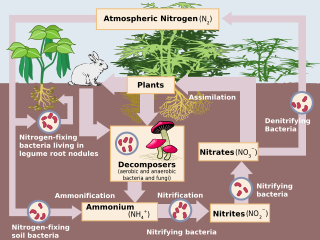process of reducing nitrates to nitrogen gases.
Denitrification is a microbially facilitated process where nitrate (NO3−) is reduced and ultimately produces molecular nitrogen (N2) through a series of intermediate gaseous nitrogen oxide products. Facultative anaerobic bacteria perform denitrification as a type of respiration that reduces oxidized forms of nitrogen in response to the oxidation of an electron donor such as organic matter. The preferred nitrogen electron acceptors in order of most to least thermodynamically favorable include nitrate (NO3−), nitrite (NO2−), nitric oxide (NO), nitrous oxide (N2O) finally resulting in the production of dinitrogen (N2) completing the nitrogen cycle. Denitrifying microbes require a very low oxygen concentration of less than 10%, as well as organic C for energy. Since denitrification can remove NO3−, reducing its leaching to groundwater, it can be strategically used to treat sewage or animal residues of high nitrogen content. Denitrification can leak N2O, which is an ozone-depleting substance and a greenhouse gas that can have a considerable influence on global warming.

The process is performed primarily by heterotrophic bacteria (such as Paracoccus denitrificans and various pseudomonads), although autotrophic denitrifiers have also been identified (e.g., Thiobacillus denitrificans). Denitrifiers are represented in all main phylogenetic groups. Generally several species of bacteria are involved in the complete reduction of nitrate to N2, and more than one enzymatic pathway has been identified in the reduction process. The denitrification process does not only provide energy to the organism performing nitrate reduction to dinitrogen gas, but also some anaerobic ciliates can use denitrifying endosymbionts to gain energy similar to the use of mitochondria in oxygen respiring organisms.
Direct reduction from nitrate to ammonium, a process known as dissimilatory nitrate reduction to ammonium or DNRA, is also possible for organisms that have the nrf-gene. This is less common than denitrification in most ecosystems as a means of nitrate reduction. Other genes known in microorganisms which denitrify include nir (nitrite reductase) and nos (nitrous oxide reductase) among others; organisms identified as having these genes include Alcaligenes faecalis, Alcaligenes xylosoxidans, many in the genus Pseudomonas, Bradyrhizobium japonicum, and Blastobacter denitrificans.
